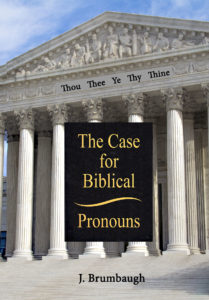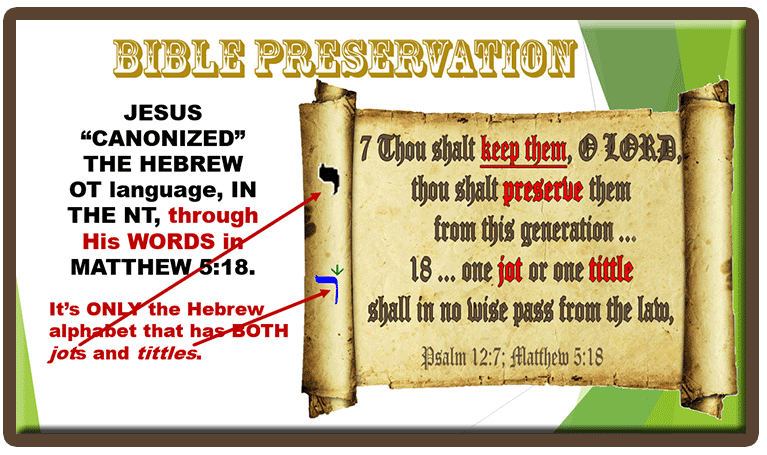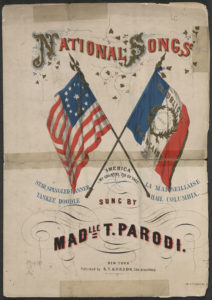![]()
 Perhaps you’re wondering what is meant by Biblical pronouns. What if added to Biblical pronouns is the word grammatical—Biblical grammatical pronouns? That’s a more definitive description of the topic of our newest publication, “The Case for Biblical Pronouns.”
Perhaps you’re wondering what is meant by Biblical pronouns. What if added to Biblical pronouns is the word grammatical—Biblical grammatical pronouns? That’s a more definitive description of the topic of our newest publication, “The Case for Biblical Pronouns.”
To be more specific, it’s all about what many deem are those pesky pronouns called archaic or old English: ye, thou, thee, thine, and thy.
However, through this writing, which we would like to share with you, you will learn WHY these are not archaic words but precisely accurate pronouns to contextually reflect the underlying manuscripts from which they have been translated.
Why two different pronouns?

For example, in Deuteronomy 6:14, why should there be the two different pronouns, YE and YOU? YE shall not go after gods, of the gods of the people which are round about YOU.
What did Jesus say to Nicodemus?

Additionally, why should John 3:7 reveal that Jesus said to Nicodemus, “Marvel not that I said unto THEE, YE must be born again”?
To whom was Satan talking?
 Consider also the first recorded attack on the Word of God when the Serpent is recorded as saying in Genesis 3:4, YE shall not surely die. How can one be sure to whom Satan was referring: to the woman or to both Adam and Eve? The answer to this and the aforementioned Scriptures (Deuteronomy 6:14 and John 3:7) is embedded in the rules for grammatical Biblical pronouns.
Consider also the first recorded attack on the Word of God when the Serpent is recorded as saying in Genesis 3:4, YE shall not surely die. How can one be sure to whom Satan was referring: to the woman or to both Adam and Eve? The answer to this and the aforementioned Scriptures (Deuteronomy 6:14 and John 3:7) is embedded in the rules for grammatical Biblical pronouns.
There is a misunderstood internal structure throughout the Bible.
There is a complex internal structure in the Bible that many Christians misunderstand, including the seriousness of the statement made by Jesus as recorded in Matthew 5:18: For verily I say unto you, Till heaven and earth pass, one jot or one tittle shall in no wise pass from the law, till all be fulfilled. Most authors of the new versions of the Bible make serious DOCTRINAL changes to Matthew 5:18 by replacing the Hebrew words jot and tittle with words which totally change the important underlying message Jesus was giving.

Jesus was also canonizing the Hebrew language of the Old Testament.

If you aren’t sure of the reasons why the Biblical pronouns and the Hebrew words jot and tittle are vital for the contextual accuracy of the words God said He would preserve, this publication will clarify those issues as well as other grammatical principles which apply throughout the Old and New Testaments.
God is not a man that He should lie.
God states repetitively such as in Psalms 12:7: Thou [God] shalt keep them [every Word], O LORD, thou shalt preserve them from this generation for ever. Has God failed to do this? Surely not!
Jesus also states: For I testify unto every man that heareth the words of the prophecy of this book, If any man shall add unto these things, God shall add unto him the plagues that are written in this book: And if any man shall take away from the words of the book of this prophecy, God shall take away his part out of the book of life, and out of the holy city, and from the things which are written in this book. Revelation 22:18-19
Add thou not unto his words, lest he reprove thee, and thou be found a liar. Proverbs 30:6
Ye shall not add unto the word which I command you, neither shall ye diminish ought from it, [what follows is the reason for not changing God’s words.] that ye may keep the commandments of the LORD your God which I command you. Deuteronomy 4:2
Who is the Author of the Bible?
You see, man does not understand the nuances of each and every Word that has been recorded such as in the example of jot and tittle. When we come across words in the Bible we do not understand, we tend to want to change them to what we feel is more understandable, or perhaps what we feel is more contemporary. However, in so-doing, man makes the assumption that he knows better than God Himself how to express God’s thoughts; thus, man makes himself the AUTHOR of the Bible rather than God.
Why do we sing, “My country ‘tis of Thee”?”

As you study “The Case for Biblical Pronouns,” you will learn precepts underlying the purpose for the grammatical pronouns and will also become aware of similar applications even outside the Bible. One such example is why in the song, “America (My Country ‘tis of thee),” we sing: “My country ‘tis of THEE … of THEE I sing,” instead of “My country … ‘tis of you … of YOU I sing.”
We hope that the above few examples from this publication will inspire you to send for your complimentary copy of “The Case for Biblical Pronouns.”
 This offer is good only for those with U.S. postal addresses and until February 28. Thereafter, “The Case for Biblical Pronouns” can be ordered from our website or by writing to us at restorationOfTheFamily@gmail.com or Restoration Of The Family; PO Box 621342; Oviedo, FL 32762 for the suggested donation of $5 plus shipping. This offer is good as long as our supply lasts.
This offer is good only for those with U.S. postal addresses and until February 28. Thereafter, “The Case for Biblical Pronouns” can be ordered from our website or by writing to us at restorationOfTheFamily@gmail.com or Restoration Of The Family; PO Box 621342; Oviedo, FL 32762 for the suggested donation of $5 plus shipping. This offer is good as long as our supply lasts.
If you have questions, would like prayer or to be added to our periodic email teaching distribution list, please email or write to us. We are blessed when we hear from you.
In Christ’s Service,
Judith Brumbaugh
President/Founder
Restoration Of The Family, Inc.
www.RestorationOfTheFamily.org


